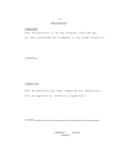| dc.description.abstract | Post-operative vomiting incidence and anti-emetic
effectiveness of Rodavan (chlorphenoxamine hydrochloride
30 mg., 8 chlorotheophylline 20 mg., and caffeine 50 mg.)
and metoclopramide (plasil) were studied in four hundred
and twenty (420) healthy Kenyan females undergoing either
dilatation and curettage or evacuation of the uterus
following incomplete abortion. These were divided into
two groups:- A and B.
Consisted of three hundred (300) patients out of
the total four hundred and twenty. These were neither
pre-treated pre-operatively with pethidine nor anti-emetics
(Rodavan or metoclopramide). They were further divided
into three (3) sub-groups of a hundred patients each;
for studying the incidence of vomiting following anaesthesia
with diethyl-ether, halothane and trichloroethylene
respectively. Each of the agent was administered in
nitrous oxide and oxygen (2~1) via a mask and semiclosed
Magill circuit (Mapleson A). Halothane concentration
inspired was up to 1%. Each patient received also
ergometrine 0.5 mg. during or immediately at the end of
the operation. Patients were nursed in theatre suite
recovery ward until awake before being transferred to the
gynaecological emergency ward. The observation for
vomiting or retching in the recovery ward was carried out
by a nurse under close instruction and supervision of the
author during the first one hour post-operatively and
subsequently for another five hours on the ward by ward
nurses with the aid of special instructions. The incidence
of nausea was not investigated as nausea was regarded as
subjective and would have involved interrogation. Vomiting
in all groups was noticed to occur during the first postoperative
hour and that due to diethyl-ether (in 50%) tended
to occur during surgery. No attempt was made to grade
the severity of vomiting or retching. The latter was
regarded as vomiting. The incidence of vomiting during
the immediate post-operative six hour period for diethylether,
halothane and trichloroethylene was 17%, 10% and
9% respectively. These figures gave an overall postoperative
vomiting incidence of 12% in the three hundred
patients. The differences in the vomiting incidence
between these three agents were not statistically
significant (diethyl-ether and halothane, X2=2.l P>O.l,
diethyl ether and trichloroethylene X2 2.82 P> 0.05).
The incidence of post-operative vomiting in healthy
African females following dilatation and curettage or
evacuation of the uterus after incomplete abortion would
appear low when compared to figures obtained in Caucasians.
As diethyl-ether produced the highest incidence
of post-operative vomiting amongst the three agents, and
as it is also the most commonly used inhalational anaesthetic
in Kenya and Uganda, it was therefore chosen for studying
the influence of pre-treatment with pethidine, Rodavan or
metoclopramide on the incidence of post-operative vomiting
following anaesthesia (with diethyl-ether).
The post-operative incidence of vomiting in twenty(20)
patients who received pethidine 50 mg. each intravenously
immediately before anaesthesia with diethyl-ether was 5%
(1 case). The number of patients investigated was
perhaps too small to enable a reliable comparison. Statistically,
there was no significant difference.
Following pre-treatment with either metoclopramide
10 mg. intravenously immediately before or Rodavan 2 tablets
orally two hours before induction of anaesthesia, the
incidence of post-operative vomiting after diethyl-ether
anaesthesia was 10% for either drug. In either case
the reduction in incidence of vomiting from 17% to 10% was
2 not statistically significant (X =2.09, P> 0.1). It
was noted that, unlike with metoclopramide, Rodavan did
not cause hypotension or dizziness. Rodavan is however
slightly more expensive than metoclopramide and it is
available only as tablet or suppository. For the ease of
administration and freedom from undesirable side effects
mentioned above, Rodavan would appear preferable to
metoclopramide in conditions where there is shortage Of
skilled nursing staff. Metoclopramide, because it can
be given parentally, would appear useful in both prevention
and treatment of post-operative vomiting. | en |
| dc.description.department | a
Department of Psychiatry, University of Nairobi, ; bDepartment of Mental Health, School of Medicine,
Moi University, Eldoret, Kenya | |

